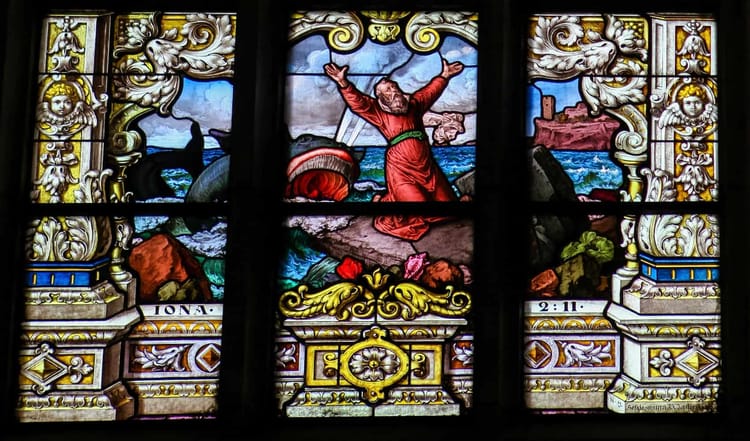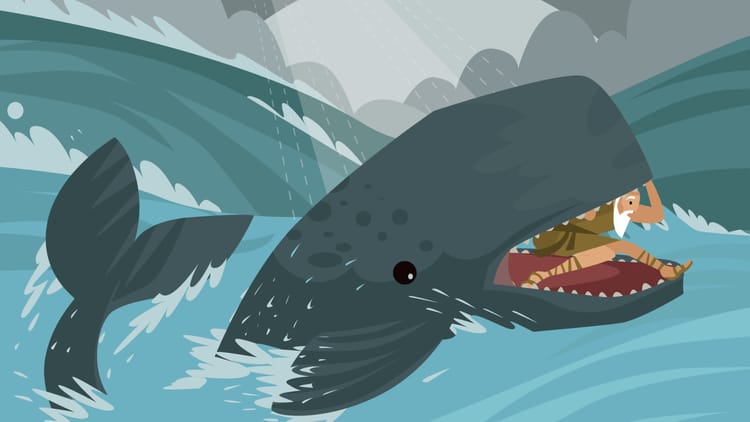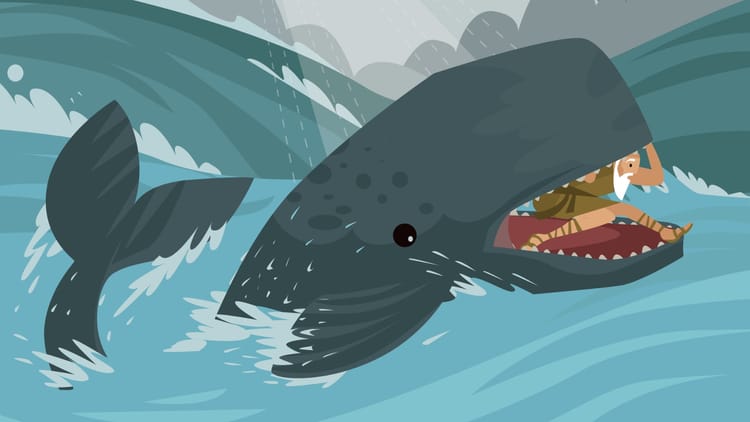What We’re Concerned About (Jonah 3-4)

Big Idea: Don't prioritize temporary matters over the eternal well-being of others.
If you’ve been with us the past few weeks, we’ve been looking at Jonah. You may know Jonah’s story because you’ve got kids, and you’ve been watching the movie. Even if you're not familiar with the Bible, you probably know the story of Jonah.
We’ve discovered that Jonah’s story is really our story, because all of us at one time have run from God. Some of us are still running. Then, last week, we looked at what happens when we’ve run. We have a tendency to think that when we’ve run, we’re not able to turn back to God because God won’t take us back. We discovered that when we’ve gone as low as we could go, run as far from him as we could, that God still welcomes us back when we call on him.
Today we come to the surprise ending of the book. If it had been up to me, Jonah 1 would have been the end. Jonah runs, God sends storm, Jonah is thrown overboard, God is just, the end. But the story doesn’t end there. God is more forgiving of Jonah than we tend to be. Jonah 2 is about Jonah getting a second chance.
Jonah 3 starts with this second chance. “Then the LORD spoke to Jonah a second time: ‘Get up and go to the great city of Nineveh, and deliver the message of judgment I have given you'” (Jonah 3:1-2). There’s not a chance that Jonah’s going to disobey this time. He knows the consequences. So Jonah goes this time, just as he’s been commanded.
This time Jonah obeyed the LORD’S command and went to Nineveh, a city so large that it took three days to see it all. On the day Jonah entered the city, he shouted to the crowds: “Forty days from now Nineveh will be destroyed!” The people of Nineveh believed God’s message, and from the greatest to the least, they decided to go without food and wear sackcloth to show their sorrow. (Jonah 3:3-5)
I read this and think, “I’m so sure that they repented that easily.” When I’m downtown, I sometimes run into street preachers. A lot of times I believe a lot of the same things that they believe, but I still don’t want to make eye contact with them. They don’t really seem like they get that good of a response.
History tells us that the residents of greater Nineveh may have been prepared to hear a message like Jonah’s. There were some warring tribes that had just struck a coalition north of Nineveh. They had just experienced two plagues that had wiped out a good chunk of the population. They had also experienced an earthquake and an eclipse. Then this guy shows up who had just spent three days in the belly of a great fish. When Jonah showed up with this message, the people said, “You know what, I think I believe him.” The response was amazingly good.
When the king of Nineveh heard what Jonah was saying, he stepped down from his throne and took off his royal robes. He dressed himself in sackcloth and sat on a heap of ashes. Then the king and his nobles sent this decree throughout the city: “No one, not even the animals, may eat or drink anything at all. Everyone is required to wear sackcloth and pray earnestly to God. Everyone must turn from their evil ways and stop all their violence. Who can tell? Perhaps even yet God will have pity on us and hold back his fierce anger from destroying us.”When God saw that they had put a stop to their evil ways, he had mercy on them and didn’t carry out the destruction he had threatened. (Jonah 3:6-10)
It’s an amazing response. Even the king responded. You’d think that Jonah would be overjoyed. If I were Jonah, I would want the story to end here – I preach, 100% of people respond, I go home in glory, the end. But the most surprising part of the story is still to come.
This change of plans upset Jonah, and he became very angry. So he complained to the LORD about it: “Didn’t I say before I left home that you would do this, LORD? That is why I ran away to Tarshish! I knew that you were a gracious and compassionate God, slow to get angry and filled with unfailing love. I knew how easily you could cancel your plans for destroying these people. Just kill me now, LORD! I’d rather be dead than alive because nothing I predicted is going to happen.”The LORD replied, “Is it right for you to be angry about this?” (Jonah 4:1-4)
Jonah’s not at all pleased with the response. It’s hard to imagine Billy Graham getting upset that so many people had responded to his invitation at a crusade, but that’s precisely what happens here. Jonah gets ticked off that the Lord is so compassionate and gracious to these people. He’d rather see them get destroyed than to repent and turn to God.
Jonah didn’t really want his nation’s enemies saved. He wanted them to be destroyed. He probably didn’t want to go back home and have to tell people where he had been and what had happened. “Where’ve you been, Jonah?” “Nineveh.” “I hope you gave it to them!” “I did. I told them they only had forty days until they’d be destroyed.” “Good! They had it coming to them. What happened?” “They repented and God decided not to punish them after all.” Nineveh’s repentance would not play very well back home.
Then Jonah went out to the east side of the city and made a shelter to sit under as he waited to see if anything would happen to the city. And the LORD God arranged for a leafy plant to grow there, and soon it spread its broad leaves over Jonah’s head, shading him from the sun. This eased some of his discomfort, and Jonah was very grateful for the plant. (Jonah 4:5-6)
I don’t know exactly what Jonah was waiting for. He may have been sitting on top of the hill waiting to see if God would change his mind and destroy Nineveh after all. Jonah might have been imitating Elijah, who felt depressed after a similar type of victory. He’s ticked because God’s so gracious. This is the surprise ending to the story. It presents Jonah – and ultimately us – in a very bad light.
Once again, Jonah’s story is our story. This is the dirty little underside to church life. It’s a picture of us at our worst – worse, in some ways, than when Jonah ran from God. Listen to how this story ends:
But God also prepared a worm! The next morning at dawn the worm ate through the stem of the plant, so that it soon died and withered away. And as the sun grew hot, God sent a scorching east wind to blow on Jonah. The sun beat down on his head until he grew faint and wished to die. “Death is certainly better than this!” he exclaimed.Then God said to Jonah, “Is it right for you to be angry because the plant died?””Yes,” Jonah retorted, “even angry enough to die!”Then the LORD said, “You feel sorry about the plant, though you did nothing to put it there. And a plant is only, at best, short lived. But Nineveh has more than 120,000 people living in spiritual darkness, not to mention all the animals. Shouldn’t I feel sorry for such a great city?” (Jonah 4:7-11)
God prepared the plant to provide Jonah comfort, but more importantly, as an object lesson for Jonah. The plant provided Jonah with some comfort, but was gone as quickly as it came. Then God sent an east wind, called a sirocco. They still have these today. It raises the temperature by about fifteen degrees Fahrenheit. There’s no humidity in the air. It’s unbearable. If you experienced it, you would want to die too. God used all that as an object lesson to reveal something dark about us.
God says, “You’re concerned about this plant?” Jonah says, “You bet.” God says, in effect, “Then is it okay for me to be concerned about the 120,000 people in Nineveh?” There’s even a little dig there: “At least can you get concerned about the animals?” And then the book ends. We don’t know what happened to Jonah, but God has made his point.I find it easy to think I’m better than Jonah, because I really do care about people, at least I think I do.
I care about people, but in the end – and here’s the dirty secret about all of us – in the end, I care about temporary things a lot more than I do about people. People last forever, and they’re what God cares about, but we’re often more about temporary things – stuff, positions, plans – than about people.
When I pick up my dry cleaning, I’m probably more concerned with the dry cleaning than I am about the people who worked on my dry cleaning. The clothes I pick up are going to by dirty in a few days, but the people’s souls are going to last forever.At work, at the gas station, at the restaurant and grocery store, it’s much easier to focus on the stuff than the people.
Today, I passed someone begging for money about a block away from here at the traffic light. When I see someone doing that, I’m usually afraid they’re going to get hit. But then it’s easy to see him as someone you wish wasn’t there. We wonder if he’s genuinely needy or just out to get our money. We wonder how he’s going to use the money. We do everything but see him the way that God sees him.
Sometimes I turn on the television on Sunday mornings while getting ready for church. World Vision sometimes shows the situation in some far-off country. It’s gut-wrenching to watch. The need seems so severe. I sometimes find myself wanting to turn the channel. They call this compassion fatigue. It’s easy not to care, or to turn my attention to other easier things.
I’ve heard a pastor say that he doesn’t really care as much what his people believe anymore. You can believe all the right things, but it doesn’t change your heart. He cares more now about what his people care about than what they believe. You can believe that people need the Lord, but caring about them personally is much more powerful. Sure, we care, but on the priority list of things we’re concerned about, it’s not near the top. We’re a lot like Jonah in that respect.
This pastor asked God to let him see people as God sees them. God answered his prayer, but after a short time he asked God to stop. It hurt too much. It cost him too much of his comfort. The second time he prayed that God would let him see people the way that God sees them, but that he would also give the strength to maintain that compassion for people.
There’s a whole other level to this: that if we’re really honest, there are some people we’re not sure if we want to see forgiven. We like them messed up, because we think they deserve it. If they were forgiven, then we’d have to forgive them too, and that would be very hard. There are people we read about in the newspapers, and we know, even with the things they’ve done, they could be forgiven if they came to God, but we hope they don’t. There are people to whom we hope God won’t show his grace and compassion.
When you came in today, you were given a flower. I’m going to ask you to do a hard thing. That flower represents Jonah’s vine. I’d like you to take it home and let it die. Don’t put it in water, don’t dry it. Just let it die. As you watch it die, I want you to think of what it is that occupies your attention and keeps you from being concerned about people, and to identify that thing with the flower. As the flower dies, it’ll remind us that the things we’re concerned about – even good things – are temporary, but people will last forever.
Prayer:
What are you concerned about? Good things, maybe bad things, but for sure, they’re temporary things. What is it that you’re most concerned about? What keeps you from seeing people the way that God sees them?
Father, I pray that you would help us identify what it is in our lives that we care about more than people. Change our hearts so we care about the things that you care about. In Jesus’ name, Amen.





